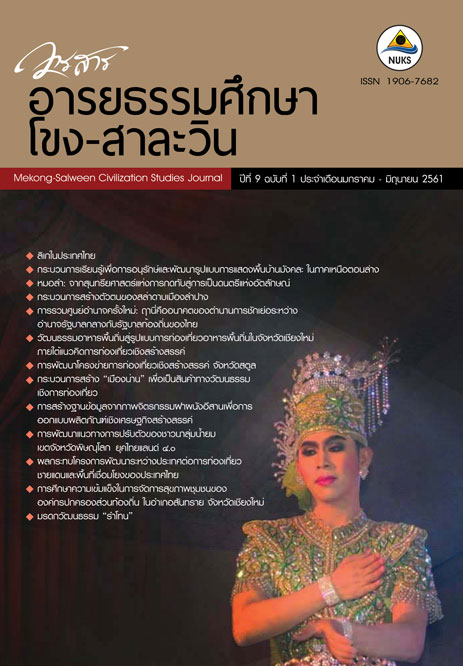ข้อตกลง
1. บทความทุกบทความจะได้รับการพิจารณาจากผู้ทรงคุณวุฒิ (Peer review) ที่ตรงตามสาขาวิชา โดยทุกบทความจะต้องผ่านการพิจารณาจากผู้ทรงคุณวุฒิ อย่างน้อยบทความละ 3 ท่าน
2. บทความ ข้อความ ภาพประกอบ และตารางใด ๆ ที่ตีพิมพ์ในวารสารอารยธรรมศึกษา โขง-สาละวิน เป็นความคิดเห็นส่วนตัวของผู้เขียน กองบรรณาธิการไม่จำเป็นต้องเห็นด้วยเสมอไป และไม่ใช่ความรับผิดชอบของ กองส่งเสริมศิลปวัฒนธรรม มหาวิทยาลัยนเรศวร ถือเป็นความรับผิดชอบของผู้เขียนแต่เพียงผู้เดียว
3. บทความจะต้องไม่เคยตีพิมพ์เผยแพร่ที่ใดมาก่อน และไม่อยู่ระหว่างการพิจารณาของวารสารฉบับอื่น หากตรวจสอบพบว่ามีการตีพิมพ์ซ้ำซ้อน ถือเป็นความรับผิดชอบของผู้เขียนแต่เพียงผู้เดียว
4. บทความที่ส่งถึงกองบรรณาธิการ ขอสงวนสิทธิ์จะไม่ส่งคืน
Recentralisation: Is it a way forward for legendary Tug-of-War between Central-Local autonomy in Thailand?
การรวมศูนย์อำนาจครั้งใหม่: ฤานี่คืออนาคตของตำนานการชักเย่อระหว่างอำนาจรัฐบาลกลางกับรัฐบาลท้องถิ่นของไทย
Keywords:
Local autonomy, Recentralisation, Pseudo-decentralisation, Human Resource Management, Participatory democracy, ThailandAbstract
This paper aims to confer on the scope of local government power in Thailand during the period 2009-2015. A case study of local governments in Loei and Nan provinces will be explored in regards to three issues: the local autonomy of both the local government and the local community; the responses of local units and the central government to decentralisation and local autonomy; and the opportunities and challenges for Thai local units. The research has found that, empirically, local autonomy and local governments’ responses to decentralisation are limited. On the other hand, the central government seems to embrace recentralisation, as decentralisation of specific functions has been authorised to local government. This situation has led to a myth to local governments in making decisions in both external and internal dimensions. Besides, challenges of genuine decentralisation depend upon adequate capacity of local civil servants, as well as local constituents. The ‘Tug-of-War’ game between the central and local government could influence Thailand’s future of decentralisation as recentralisation.
References
Arnstein, S. R. (1969). A ladder of citizen participation. Journal of the American Institute of planners, 35(4), 216-224.
Allison, T. (2000). The Trans Thai-Malaysia natural gas project. Asia Times On Line.
Awortwi, N. (2010). The past, present, and future of decentralisation in Africa: A comparative case study of local government development trajectories of Ghana and Uganda. International journal of public administration, 33(12-13), 620-634.
Bowornwathana, B. (2011). History and political context of public administration in Thailand. Public Administration in Southeast Asia: Thailand, Philippines, Malaysia, Hong Kong, and Macao, 29-52.
Brown, K. 2004. Human resource management in the public sector. Public Management Review, 6, 303-309.
Charoenying, P., 2008. The study project for people‘s participation in a community forest management: The case of Tambon Khao Kok, Amphoe Pratonchai, Buriram Provice. Availabe at: http://www.trf.or.th/research/project_detail.asp?PROJECTID=RDG4840003 [in Thai]
Choguill, M. B. G. (1996). A ladder of community participation for underdeveloped countries. Habitat international, 20(3), 431-444.
DOLA 2010. Department of Local Administration, Bangkok, The Ministry of Interior.
DRECHSLER, W. 2005. The Rise and Demise of the New Public Management. Post-autistic Economics Review, 33, 1-9.
DOLA-OFFICE 2003. Evaluation of Local Pesonnel Administration and its Rules. Bangkok, Thailand: Division of Legal Affairs on Local Personnel Administration.
Haque, M. S. (2010). Decentralizing local governance in Thailand: Contemporary trends and challenges. International Journal of Public Administration, 33(12-13), 673-688.
Kessy, A. T., & McCourt, W. (2010). Is decentralisation still recentralization? The local government reform programme in Tanzania. International Journal of Public Administration, 33(12-13), 689-697.
Khoo, B. T. (2010). Social movements and the crisis of neoliberalism in Malaysia and Thailand.
Laird, J. (2000). Money politics, globalisation, and crisis: The case of Thailand. Graham Brash.
Li, L. C. (2010). Central‐local relations in the people's Republic of China: Trends, processes and impacts for policy implementation. Public administration and development, 30(3), 177-190.
Leungaramsri, P., & Rajesh, N. (1992). future of people and forests in Thailand after the logging ban.
Local Development Institute, 1993. Pa Chum Chon Nai Prathet Thai: Naew Tang Karn Pattana [Community Forests in Thailand: The path to develop]. Bangkok: Local Development Institute.
Mansrisuk, C. (2012). Decentralisation in Thailand and the limits of the functionalist perspective of institutional reform. European Journal of East Asian Studies, 11(1), 71-97.
Mutebi, A. M. (2004). Recentralising while decentralising: Centre-local relations and “CEO” governors in Thailand. Asia Pacific Journal of Public Administration, 26(1), 33-53.
Nagai, F., Funatsu, T., & Kagoya, K. (1997). Central-local government relationship in Thailand. Constitution, 1(1).
Nagai, F., & Kagoya, K. (2008). Local capability and decentralisation in Thailand. Local Government in Thailand—Analysis of the Local Administrative Organisation Survey, 51-60.
Pratchett, L. (2004). Local autonomy, local democracy and the ‘new localism’. Political studies, 52(2), 358-375.
Rees, C. J., & Hossain, F. (2010). Perspectives on decentralisation and local governance in developing and transitional countries. International Journal of Public Administration, 33(12-13), 581-587.
Rojanasupot, S., 2005. Communication for the participation in community forest management of people in Huay Kaew community, Mae On 220
Sub-district, Chiang Mai Province [Abstract on-line]. Available at: http://www.trf.or.th/research/abstract_eng.asp?PROJECTID=RDG4540021
Rungtawanruengsri. S., 2007. Economic valuation of community forest in the South: A case study of Khao-Hua-Chang community forest Tambon Tamot, Amphoe Tamot, Changwat Phatthalung. Available at: http://www.trf.or.th/research/project_detail.asp?PROJECTID=MRG4780216 [in Thai]
Srisupan, W., 2006. Communication development for people‘s participation in community forest management in Samakae community, Na Suan Sub-district, Srisawat District, Karnchanaburi Province. Availabe at: http://www.trf.or.th/research/project_detail.asp?PROJECTID=RDG4540002 [in Thai]
Somsak, S., (2002). Study Project for management and development of the community forest network in Nan Province [in Thai language]. Chiangmai: Tha Thailand Research Fund (Northern Region Branch).
Verbeeten, F. H. M. (2008). Performance management practices in public sector organisations: Impact on performance Accounting, Auditing & Accountability Journal, 21, 427-454.
Verhoest, K., Peters, B. G., Bouckaert, G., & Verschuere, B. (2004). The study of organisational autonomy: a conceptual review. Public administration and development, 24(2), 101-118.
Wongpreedee, A., & Mahakanjana, C. (2011). Decentralisation and Local Governance in Thailand. Public Administration in Southeast Asia, 53-78.
Wunsch, J. S. (2001). Decentralisation, local governance and ‘recentralization’in Africa. Public Administration and Development, 21(4), 277-288.
Young, S., & Tavares, A. T. (2004). Centralization and autonomy: back to the future. International Business Review, 13(2), 215-237.








